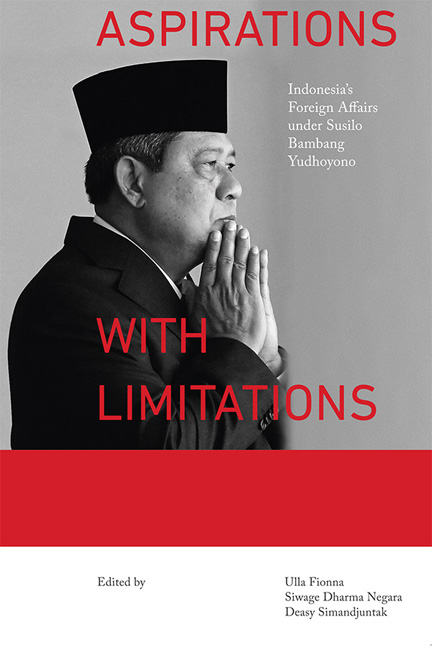Book contents
- Frontmatter
- Contents
- About the Contributors
- 1 Introduction
- 2 Indonesian Foreign Policy: Waging Peace, Stability, and Prosperity
- 3 Indonesia's Diplomatic and Strategic Position under Yudhoyono
- 4 International Economic Cooperation during the Yudhoyono Presidency
- 5 First Term Right, Second Term Shy: A Review of Indonesia's Economic Links with Key Trading Partners
- 6 International Labour Migration: A Very Mixed Blessing
- 7 Law Enforcement, Prevention, and Deradicalization: How SBY Handled Terrorism
- 8 Drifting towards Dynamic Equilibrium: Indonesia's South China Sea Policy under Yudhoyono
- 9 Uneasy Neighbours: Indonesia–Malaysia Relations under Yudhoyono
- 10 A Fair Dinkum Partnership? Australia–Indonesia Ties during the Yudhoyono Era
- 11 The Aceh Peace Process: Wheeling and Dealing behind Closed Doors
- Index
6 - International Labour Migration: A Very Mixed Blessing
Published online by Cambridge University Press: 08 June 2019
- Frontmatter
- Contents
- About the Contributors
- 1 Introduction
- 2 Indonesian Foreign Policy: Waging Peace, Stability, and Prosperity
- 3 Indonesia's Diplomatic and Strategic Position under Yudhoyono
- 4 International Economic Cooperation during the Yudhoyono Presidency
- 5 First Term Right, Second Term Shy: A Review of Indonesia's Economic Links with Key Trading Partners
- 6 International Labour Migration: A Very Mixed Blessing
- 7 Law Enforcement, Prevention, and Deradicalization: How SBY Handled Terrorism
- 8 Drifting towards Dynamic Equilibrium: Indonesia's South China Sea Policy under Yudhoyono
- 9 Uneasy Neighbours: Indonesia–Malaysia Relations under Yudhoyono
- 10 A Fair Dinkum Partnership? Australia–Indonesia Ties during the Yudhoyono Era
- 11 The Aceh Peace Process: Wheeling and Dealing behind Closed Doors
- Index
Summary
June 2011 was a month that encapsulated the highs and lows of Susilo BambangYudhoyono's (SBY's) policies on international migrant workers. On the eleventh of that month the Indonesian president proudly announced his support for the migrant worker convention in one of his many eloquent speeches, on this occasion given as a guest at the 100th annual meeting of the International Labour Organization (ILO) in Geneva. A week later this socially responsive approach was sharply questioned by the execution of the Indonesian maid Ruyati Binti Sapubi in Saudi Arabia, in part signalling a foreign policy failure on the part of SBY, and one that was widely criticized at home. Some have argued that international migration was one area among many where SBY promised more than he could deliver; while introducing a number of innovations, and eventually taking a hard line with several of the host countries for Indonesia migrants, it is said that the government struggled to get beyond “rhetoric” in devising practical policies and building the institutions to support them (Budianti, Chandrakirana and Yentriyani 2015, p. 210).
The government continued to strongly support international migration as a source of employment and of foreign exchange during the SBY years. During this period the number of Indonesians working abroad increased substantially and its composition changed, first more in favour of females and domestic workers and later back to a greater reliance on males and formal sector workers, mainly as a result of government reassessment of priorities. However, there was a policy shift during SBY's second term after shortcomings were increasingly exposed in the media and by civil society groups. Because of continuing reports of exploitation of female domestic workers in particular, culminating in the execution of Ruyati in 2011, the government temporarily halted the sending of domestic workers to the main recipient countries, Malaysia (in 2009) and later Saudi Arabia. At the same time, there were a number of important new institutional developments. These included bilateral agreements with receiving countries that had the potential to improve migrant conditions overseas. Regrettably, reform was slow and piecemeal. The regulatory and institutional changes did not have a positive impact on the welfare of migrant workers, which officials had promised and many observers had pressed for.
- Type
- Chapter
- Information
- Aspirations with LimitationsIndonesia's Foreign Affairs under Susilo Bambang Yudhoyono, pp. 105 - 135Publisher: ISEAS–Yusof Ishak InstitutePrint publication year: 2018



